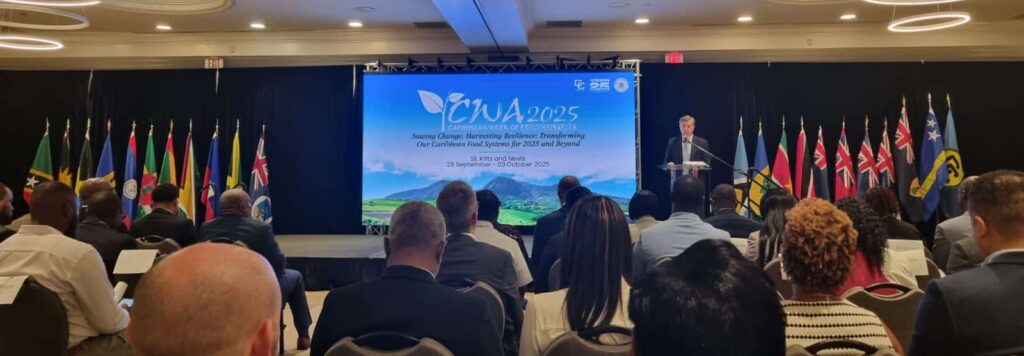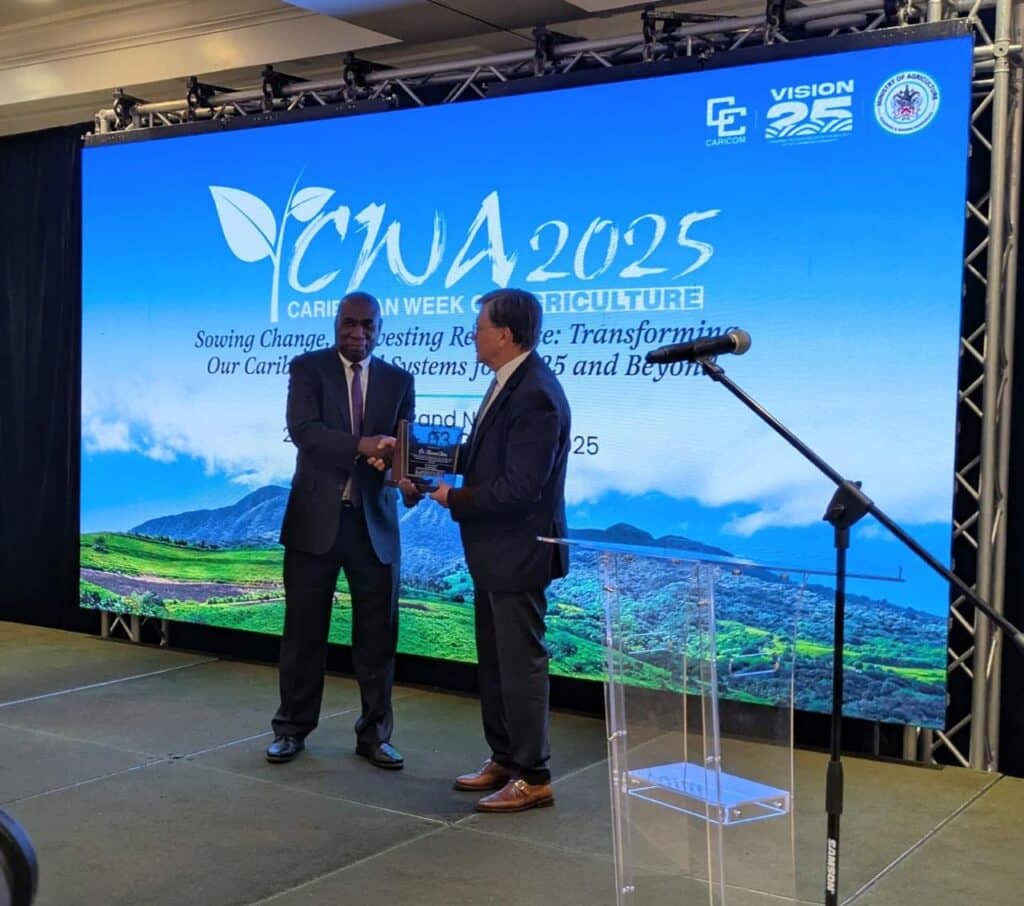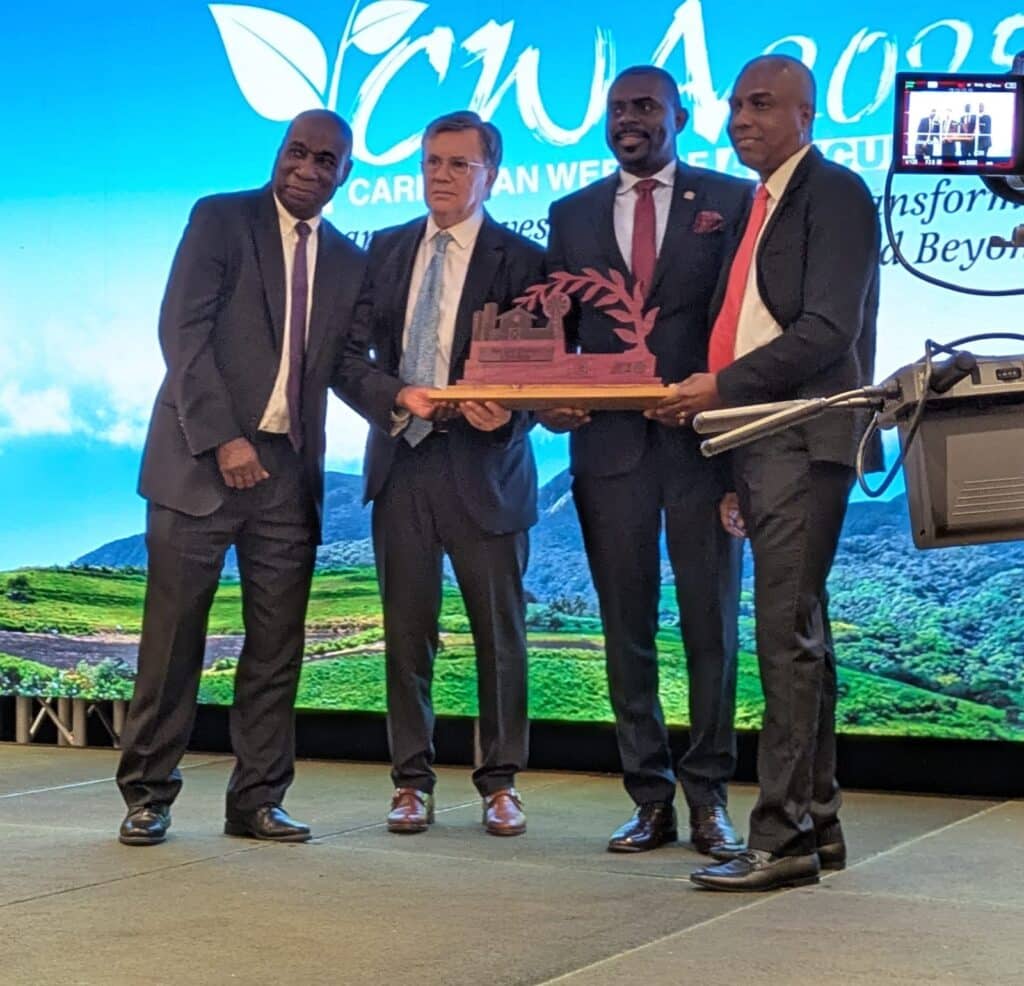
BASSETERRE, Saint Kitts and Nevis, September 30, 2025 (IICA) – The Director General of the Inter-American Institute for Cooperation on Agriculture (IICA), Manuel Otero, highlighted the significant progress made in recent years by Caribbean agriculture toward greater productivity and resilience, and underscored the Institute’s ongoing commitment to supporting those achievements through its technical cooperation work.
He did so as one of the opening speakers at the 19th edition of Caribbean Week of Agriculture (CWA), which brought together ministers from the region, members of international organizations and the diplomatic corps, as well as representatives of producer organizations and civil society.
CWA—the most important event on the Caribbean agricultural calendar—is being held this year in Saint Kitts and Nevis under the theme “Sowing Change, Harvesting Resilience: Transforming Our Caribbean Food Systems for 2025 and Beyond”. IICA is one of the organizers of the event in a region where the Institute has 14 Delegations and implements various cooperation projects aimed at building a sustainable and resilient present and future for agriculture.
During the opening ceremony, the nations of the Caribbean Community (CARICOM) presented Otero with a recognition—the LEADERSHIP AWARD—for his leadership and for IICA’s commitment under his administration to strengthening the region’s agriculture.
Otero also joined the Minister of Agriculture, Fisheries and Marine Resources of Saint Kitts and Nevis, Samal Duggins, in presenting the 2025 CARICOM Farmer of the Year Award, which was granted to the Jamaican company Best Dressed Chicken.

Wendell Samuel, CARICOM Deputy Secretary-General, presenting the LEADERSHIP AWARDto Manuel Otero, Director General of IICA.
Reducing food imports
The CWA—whose first edition took place in Trinidad and Tobago in 1999—aims to strengthen the Caribbean agricultural sector, which is essential to effectively reducing the region’s high food import bill. Attracting transformative and sustainable investments in agriculture and regional food production therefore remains a strategic priority for the CARICOM region.
Throughout the week, the gathering will feature seminars, key meetings, and field visits, attracting the leading decision-makers from both the public and private sectors of Caribbean agriculture.
“Caribbean Week of Agriculture is more than just a meeting; it is a reaffirmation of our shared vision that Caribbean agriculture lies at the heart of resilience, prosperity, and food security”, said Otero.
The IICA Director General recalled that, upon taking office in January 2018, he set out to develop a differentiated strategy for the Caribbean, based on the premise that the region—composed largely of small island states—is highly vulnerable to natural disasters.
“That differentiated strategy for the region”, he explained, “allowed IICA to be more responsive to the needs for technical cooperation in the Caribbean. In this way, the Institute’s actions have taken into account the needs of small farmers, the region’s high dependence on food imports, and the many resource-poor actors along the food chain who face countless challenges, including soil degradation, low levels of productivity, investment, and adoption of technology and innovation”.
Otero explained that IICA created a special fund to support the 25 by 2025 Vision, through which CARICOM set the goal of reducing food import dependency by 25%. In this way, the Institute contributed to the development of a new variety of zinc-enriched biofortified rice launched in 2023; supported the Organization of Eastern Caribbean States (OECS) in developing and implementing its strategy for transforming food and agricultural systems; and carried out broad capacity-building initiatives.
He also pointed out that, in light of the recurrence of natural disasters, particularly tropical storms, IICA established the Hemispheric Fund for Agricultural Resilience and Sustainability in the Americas (FoHRSA), launched in 2024, in an effort to respond effectively to the persistent challenge of climate finance faced by developing countries, particularly in the Caribbean.
In addition, the Director General highlighted IICA’s role as a bridge to ensure that Caribbean nations received, during difficult moments for their agriculture, donations of inputs and seeds from other countries in the hemisphere.
Otero noted that this was his last participation in Caribbean Week of Agriculture, since in November the Ministers of Agriculture of the Americas will elect a new IICA Director General, who will take office in January 2026. “Whoever is chosen for the position, I am confident that IICA’s commitment to the Caribbean nations will not falter”, he concluded.

Wendell Samuel, CARICOM Deputy Secretary-General; Manuel Otero, Director General of IICA; Samal Duggins, Minister of Agriculture, Fisheries and Marine Resources of Saint Kitts and Nevis; and Dave Fairman, Vice President of Best Dressed Chicken, winner of the 2025 Caribbean Community Farmer of the Year Award.
More information:
Institutional Communication Division.
comunicacion.institucional@iica.int











